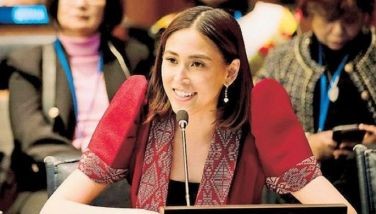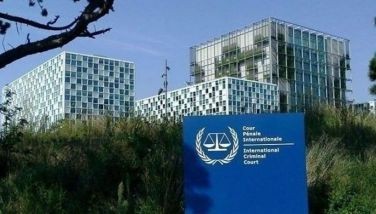Gov’t splurges millions on lobby deals
September 21, 2005 | 12:00am
Since 2001, the Arroyo administration has spent at least $3.7 million or P208 million on eight multiple, loosely monitored, and largely secret consultancy contracts for eight US-based lobby and law firms.
The controversial agreement with the law firm Venable LLP is only the latest contract that Mrs. Arroyo had authorized her Cabinet deputies to sign in the name of the Government of the Republic of the Philippines.
The $75,000-monthly deal with Venable, which involves securing donations and US Congress earmarks for her Charter change initiative, will remain in force at least until the end of 2005, despite official pronouncements that it has been revoked.
This is because the Venable contract specifies that the agreement may be canceled only by giving 90 days notice and only after "all fees and expenses incurred through the date of the termination period have been paid." The contract, which was signed in July, also committed the government to pay a three-month advance.
Apart from Venable, three other consulting firms have "active status" contracts and continue to receive huge dollar fees from the government. While there is nothing wrong with engaging US firms to promote Philippine interests in the United States, the contracts have been questioned because of the secrecy with which they had been signed and the government’s refusal to disclose exactly who is footing the bill for these services. Because of the secrecy, it is not possible to check whether the funds used for these contracts are well spent.
US federal laws require lobby firms to file disclosure and financial reports on their engagement as agents of foreign principals, but in the absence of similar laws in the Philippines, the same contracts remain closely guarded secrets of Malacañang.
Since the Marcos era, all Philippine presidents have hired US lobbyists. US government records show that the government of Joseph Estrada paid $1.3 million, or P72.8 million, for four lobbying contracts it signed with as many consultants from July 1999 to December 2000.
Today Palace officials insist that the contracts are paid for by businessmen. But budget sources said confidential and intelligence expense accounts under control of the Office of the President are being used to bankroll these agreements. Confidential and intelligence expenses are not subject to government audit. All the President has to do is to write a confidential letter to the chairman of the Commission on Audit listing down the expenses incurred under these accounts. No receipts are needed.
Apart from Venable, the most expensive of the three other "active status" consultancy contracts that the Arroyo administration continues to pay is the $1-million per year public relations deal with Burson-Marsteller, "the world’s fifth largest PR firm."
The firm was hired to render "global communications support to assist in the promotion of international investor confidence… support for media relations, economic communications materials development and distribution, communications training, and ongoing provision of senior counsel."
The last item involves an "image makeover" of Mrs. Arroyo, who has been described as charisma-challenged. Richard Mintz, who managed the US Department of Transportation’s media office under former President Bill Clinton, and served as staff director for Sen. Hillary Clinton during the 1992 campaign, heads Burson-Marsteller’s global PR advocacy.
Burson-Marsteller signed its first 12-month contract with the Arroyo government in July 2001 ($800,000 retainer fees, plus $200,000 in "out-of-pocket expenses" per year) but remains on government payroll to this day. In its latest financial report, Burson-Marsteller said it received from the Philippine government $447,494.64 in fees and expenses from May 1 to Oct. 31, 2004.
If Burson-Marsteller seems partial to Democrats in the US, another contract was awarded to a lobby firm with Republican leanings — Bannerman & Associates Inc.
The Philippine government, through its embassy in Washington, hired Bannerman for $216,000 a year to "contact members of Congress and the Executive Branch to determine support for any legislation that affects the (sic) US-Philippine relationship" and "work to create a supportive political environment for these issues through the general promotion of the US-Philippine relationship."
M. Graeme Bannerman, who served as staff director of the Senate foreign relations committee and was member of the Bureau of Intelligence and Research and of the Policy Planning Staff at the State Department, heads the firm.
In the six-month period ending April 28, 2005, Bannerman reported receiving $86,981 from the Philippine government.
Yet another contract involves getting legal advice from White & Case LLP, a big and old US law firm with associates across the world and clients that include private companies, financial institutions and governments.
The agreement with White & Case was signed for the government on April 24, 2005 by the Office of the Solicitor-General to "represent the Republic of the Philippines in an ice arbitration initiated by Piatco and in an ICSID arbitration initiated by Fraport arising from claims related to the development of the Manila Airport."
For this job, White & Case said it would bill the Philippine government "by the hour" but did not specify its professional fee rates.
Apart from these four ongoing contracts, the Arroyo administration had also entered into four other agreements, variably called "engagement letter" or "letter of agreement" or "retainer agreement" or "consulting agreement."
The first of these consummated deals was one inherited from the Estrada administration with Patton Boggs LLP, that boasts of "a reputation for cutting-edge advocacy by working closely with Congress and regulatory agencies in Washington, litigating in courts across the country, and negotiating business transactions around the world" for "200 international clients from over 70 countries."
For its Philippine contract, Patton Boggs hired an old Philippine hand, Ambassador Philip S. Kaplan, deputy chief of mission of the US embassy in Manila in 1985-87.
San Juan Rep. Ronaldo Zamora, Estrada’s executive secretary who signed the contract with Patton Boggs for the period July 1, 2000- June 30, 2001, said the Estrada administration merely inherited the consulting contract from the government of Fidel Ramos, which the law firm had supposedly served earlier "for about four to five years."
The Patton Boggs contract is most distinguished for its brevity — its text is all of four paragraphs, including one where Kaplan instructed Zamora to remit consultancy fees to the firm’s Riggs Bank account.
But by far the most curious and clearly onerous of the concluded contracts is the first that Mrs. Arroyo’s administration signed in July 2001, or barely five months after she took power.
This contract was awarded to MH International, a small consulting firm with no track record that is owned by Maria Luisa Mabilangan Haley, a Filipino-American employee and Export-Import Bank board director-designate of Bill Clinton.
Haley and her husband John had been implicated in alleged conduit contributions by the Lippo Group of Indonesia to the Clinton re-election campaign.
Haley’s contract with the Philippine government that was signed by Foreign Affairs Secretary Alberto Romulo, at the time Arroyo’s executive secretary, required her to serve as "an independent contractor to render advisory services on a non-exclusive basis."
To do this, she informed the US justice department she would "coordinate services through vocal, written, or electronic contact. Temporary travel may be required" and "advise or coordinate services for the Republic of the Philippines as assigned."
Even as her reporting duties are not spelled out, Haley was awarded $180,000 in retainer fee, plus $36,000 in "reasonable business expenses, including business class air travel" per year, for a monthly take of $18,000 or P1 million.
In addition, she secured an "indemnification" clause in her contract that obliged the government to pay her all costs, charges and liabilities in case she is involved in any legal action arising from the contract.
For all the millions of dollars that had been spent on foreign consultancy and lobbying firms, government officials have yet to agree on firm quantitative or qualitative measures to assess whether the country is getting its money’s worth.
After all, despite his array of consultants, the economy floundered and Estrada was ousted. Over the last four years, Arroyo’s economic team has largely failed to shore up the level of direct or portfolio investments. The situation has started to turn bright only this year.
"You have to make subjective judgment on whether the figures tell the real story or not, you cannot be objective," said Zamora.
"The problem is for everything good that happens in the country, the consultants will claim a part of. For everything bad, they would say they have no role in it," he added.
To be sure, the hiring of consultants reflects in part the lack of confidence in, perhaps even respect for the Philippines’ foreign service corps. The country’s diplomatic contingent in North America is the largest posting of the foreign affairs department, but it is also there where Arroyo has hired a bevy of consultants.
In Zamora’s mind, this is a waste of money: "Because of consultants, you get a lot of free time if you are in mission. Many ambassadors could afford not to stay in the mission, travel abroad, work out personal business deals." Consultants, he added, tend to "remove a lot of load off our envoys."
The difference, however, is that while foreign consultants could claim up to millions in fees and reimburse expenses sans ceilings, Filipinos serving in the foreign service could not.
At the very least, Zamora reckons that consultants like Philip Kaplan of Patton Boggs offered President Estrada great company. "Kaplan flew three or four times a year to the Philippines when he was our consultant."
Once in Manila, Kaplan and his wife Barbara would hie off promptly to Malacañang for dinner meetings with Estrada and First Lady Luisa Ejercito.
In the state dining room through the night, over good food and good wine, the consultant briefed the President on the latest grist coming out of "the Washington gossip line."
The controversial agreement with the law firm Venable LLP is only the latest contract that Mrs. Arroyo had authorized her Cabinet deputies to sign in the name of the Government of the Republic of the Philippines.
The $75,000-monthly deal with Venable, which involves securing donations and US Congress earmarks for her Charter change initiative, will remain in force at least until the end of 2005, despite official pronouncements that it has been revoked.
This is because the Venable contract specifies that the agreement may be canceled only by giving 90 days notice and only after "all fees and expenses incurred through the date of the termination period have been paid." The contract, which was signed in July, also committed the government to pay a three-month advance.
Apart from Venable, three other consulting firms have "active status" contracts and continue to receive huge dollar fees from the government. While there is nothing wrong with engaging US firms to promote Philippine interests in the United States, the contracts have been questioned because of the secrecy with which they had been signed and the government’s refusal to disclose exactly who is footing the bill for these services. Because of the secrecy, it is not possible to check whether the funds used for these contracts are well spent.
US federal laws require lobby firms to file disclosure and financial reports on their engagement as agents of foreign principals, but in the absence of similar laws in the Philippines, the same contracts remain closely guarded secrets of Malacañang.
Since the Marcos era, all Philippine presidents have hired US lobbyists. US government records show that the government of Joseph Estrada paid $1.3 million, or P72.8 million, for four lobbying contracts it signed with as many consultants from July 1999 to December 2000.
Today Palace officials insist that the contracts are paid for by businessmen. But budget sources said confidential and intelligence expense accounts under control of the Office of the President are being used to bankroll these agreements. Confidential and intelligence expenses are not subject to government audit. All the President has to do is to write a confidential letter to the chairman of the Commission on Audit listing down the expenses incurred under these accounts. No receipts are needed.
Apart from Venable, the most expensive of the three other "active status" consultancy contracts that the Arroyo administration continues to pay is the $1-million per year public relations deal with Burson-Marsteller, "the world’s fifth largest PR firm."
The firm was hired to render "global communications support to assist in the promotion of international investor confidence… support for media relations, economic communications materials development and distribution, communications training, and ongoing provision of senior counsel."
The last item involves an "image makeover" of Mrs. Arroyo, who has been described as charisma-challenged. Richard Mintz, who managed the US Department of Transportation’s media office under former President Bill Clinton, and served as staff director for Sen. Hillary Clinton during the 1992 campaign, heads Burson-Marsteller’s global PR advocacy.
Burson-Marsteller signed its first 12-month contract with the Arroyo government in July 2001 ($800,000 retainer fees, plus $200,000 in "out-of-pocket expenses" per year) but remains on government payroll to this day. In its latest financial report, Burson-Marsteller said it received from the Philippine government $447,494.64 in fees and expenses from May 1 to Oct. 31, 2004.
If Burson-Marsteller seems partial to Democrats in the US, another contract was awarded to a lobby firm with Republican leanings — Bannerman & Associates Inc.
The Philippine government, through its embassy in Washington, hired Bannerman for $216,000 a year to "contact members of Congress and the Executive Branch to determine support for any legislation that affects the (sic) US-Philippine relationship" and "work to create a supportive political environment for these issues through the general promotion of the US-Philippine relationship."
M. Graeme Bannerman, who served as staff director of the Senate foreign relations committee and was member of the Bureau of Intelligence and Research and of the Policy Planning Staff at the State Department, heads the firm.
In the six-month period ending April 28, 2005, Bannerman reported receiving $86,981 from the Philippine government.
Yet another contract involves getting legal advice from White & Case LLP, a big and old US law firm with associates across the world and clients that include private companies, financial institutions and governments.
The agreement with White & Case was signed for the government on April 24, 2005 by the Office of the Solicitor-General to "represent the Republic of the Philippines in an ice arbitration initiated by Piatco and in an ICSID arbitration initiated by Fraport arising from claims related to the development of the Manila Airport."
For this job, White & Case said it would bill the Philippine government "by the hour" but did not specify its professional fee rates.
Apart from these four ongoing contracts, the Arroyo administration had also entered into four other agreements, variably called "engagement letter" or "letter of agreement" or "retainer agreement" or "consulting agreement."
The first of these consummated deals was one inherited from the Estrada administration with Patton Boggs LLP, that boasts of "a reputation for cutting-edge advocacy by working closely with Congress and regulatory agencies in Washington, litigating in courts across the country, and negotiating business transactions around the world" for "200 international clients from over 70 countries."
For its Philippine contract, Patton Boggs hired an old Philippine hand, Ambassador Philip S. Kaplan, deputy chief of mission of the US embassy in Manila in 1985-87.
San Juan Rep. Ronaldo Zamora, Estrada’s executive secretary who signed the contract with Patton Boggs for the period July 1, 2000- June 30, 2001, said the Estrada administration merely inherited the consulting contract from the government of Fidel Ramos, which the law firm had supposedly served earlier "for about four to five years."
The Patton Boggs contract is most distinguished for its brevity — its text is all of four paragraphs, including one where Kaplan instructed Zamora to remit consultancy fees to the firm’s Riggs Bank account.
This contract was awarded to MH International, a small consulting firm with no track record that is owned by Maria Luisa Mabilangan Haley, a Filipino-American employee and Export-Import Bank board director-designate of Bill Clinton.
Haley and her husband John had been implicated in alleged conduit contributions by the Lippo Group of Indonesia to the Clinton re-election campaign.
Haley’s contract with the Philippine government that was signed by Foreign Affairs Secretary Alberto Romulo, at the time Arroyo’s executive secretary, required her to serve as "an independent contractor to render advisory services on a non-exclusive basis."
To do this, she informed the US justice department she would "coordinate services through vocal, written, or electronic contact. Temporary travel may be required" and "advise or coordinate services for the Republic of the Philippines as assigned."
Even as her reporting duties are not spelled out, Haley was awarded $180,000 in retainer fee, plus $36,000 in "reasonable business expenses, including business class air travel" per year, for a monthly take of $18,000 or P1 million.
In addition, she secured an "indemnification" clause in her contract that obliged the government to pay her all costs, charges and liabilities in case she is involved in any legal action arising from the contract.
For all the millions of dollars that had been spent on foreign consultancy and lobbying firms, government officials have yet to agree on firm quantitative or qualitative measures to assess whether the country is getting its money’s worth.
After all, despite his array of consultants, the economy floundered and Estrada was ousted. Over the last four years, Arroyo’s economic team has largely failed to shore up the level of direct or portfolio investments. The situation has started to turn bright only this year.
"You have to make subjective judgment on whether the figures tell the real story or not, you cannot be objective," said Zamora.
"The problem is for everything good that happens in the country, the consultants will claim a part of. For everything bad, they would say they have no role in it," he added.
To be sure, the hiring of consultants reflects in part the lack of confidence in, perhaps even respect for the Philippines’ foreign service corps. The country’s diplomatic contingent in North America is the largest posting of the foreign affairs department, but it is also there where Arroyo has hired a bevy of consultants.
In Zamora’s mind, this is a waste of money: "Because of consultants, you get a lot of free time if you are in mission. Many ambassadors could afford not to stay in the mission, travel abroad, work out personal business deals." Consultants, he added, tend to "remove a lot of load off our envoys."
The difference, however, is that while foreign consultants could claim up to millions in fees and reimburse expenses sans ceilings, Filipinos serving in the foreign service could not.
At the very least, Zamora reckons that consultants like Philip Kaplan of Patton Boggs offered President Estrada great company. "Kaplan flew three or four times a year to the Philippines when he was our consultant."
Once in Manila, Kaplan and his wife Barbara would hie off promptly to Malacañang for dinner meetings with Estrada and First Lady Luisa Ejercito.
In the state dining room through the night, over good food and good wine, the consultant briefed the President on the latest grist coming out of "the Washington gossip line."
BrandSpace Articles
<
>
- Latest
- Trending
Trending
Latest



























